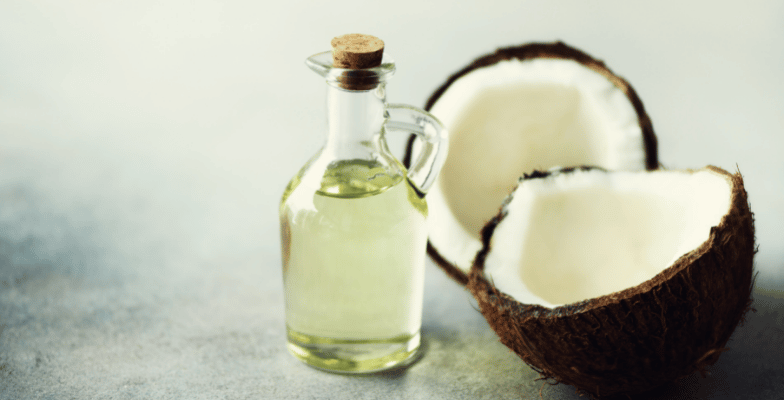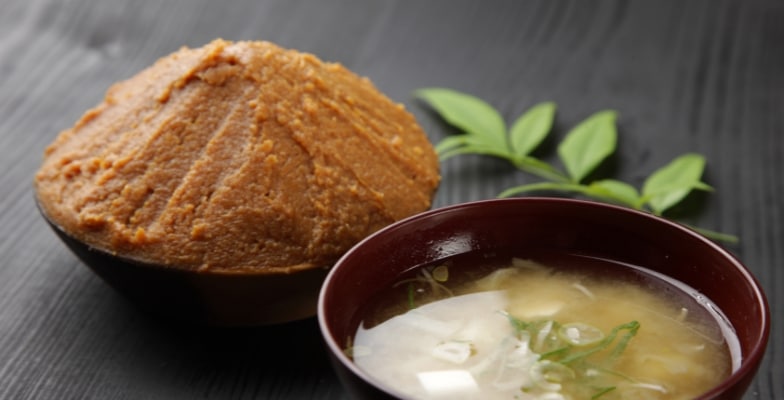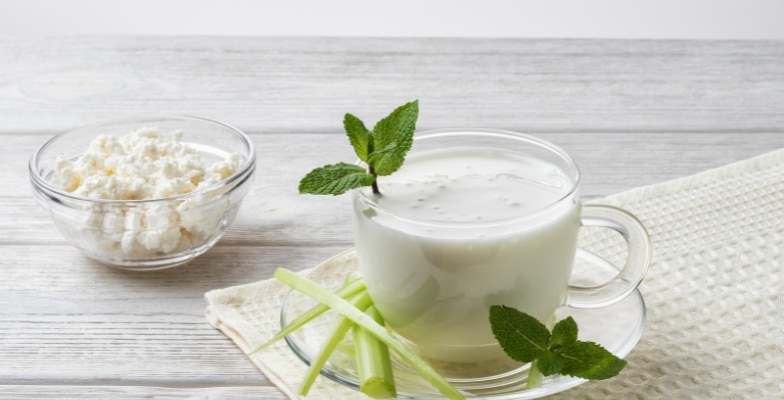Coconut Oil: Good Or Bad?
- What Is Coconut Oil?
- Saturated Fat In Coconut Oil
- Is Coconut Oil Good Or Bad For Health?
- Conclusion And My Recommendation

A few years back, I tried coconut oil for cooking. I cooked eggs and some green veggies in it! To be honest, at first, I did not like the way it smelled or tasted. But, I continued using it as my main cooking oil and eventually grew fond of it. 🙂
There Are Two Reasons I Have Been Using Coconut Oil For Many Years Now
1) As a nutrition advisor and teacher with many students, many people started to ask me whether they should use coconut oil for cooking. To be confident in deciding whether I should recommend anything, in most cases, I try it for many months so I can experience it firsthand and understand how it affects my health.
What I write is usually an extension of me, what I experience in my everyday life, including my habits, food choices, lifestyle choices, and so forth.
2) I was somewhat bored with cooking my food in ghee 🙂 And was looking for some variety in my meals. Coconut oil was a perfect choice, and I was excited to make it a part of my lifestyle.
In this article, I will discuss everything you need to know about coconut oil.
What Is Coconut Oil?
Coconut is one of Mother Nature’s sweetest fruits. Coconut can also be classified as a nut or a seed. Coconut oil is made either via dry or wet processing. In the dry process, copra is created first.
Copra is dried coconut meat, which is extracted from the shell and dried using sunlight or fire. The wet process uses coconut milk from raw coconut instead of copra. The yield of the wet process, when compared with the dry method, is significantly (10-15%) less.
Please note the way any oil is processed will ultimately determine how healthy it is. Most commercially available oils are processed with chemical agents. Some are partially hydrogenated, creating a bad type of fat called trans fat. For manufacturers, trans fat is good because it adds shelf life to the final product. But for us, it’s best to avoid trans fats!
The words you should look for when shopping for oils are virgin or extra virgin. These words signify that the oil is minimally processed without chemical or foreign agents. Another term to look for is cold pressed. This means the oil is extracted using cold-pressed technology.
When oil is cold-pressed, no heat is used during processing. Cold pressing ensures that nutrients are not structurally altered but are kept in as natural a state as possible. Let’s look at the nutritional value of coconut oil.
Nutrition Facts For 15g (1 Tbsp) Coconut Oil
Calories- 135
Protein- 0g
Carbohydrates- 0g
Total fat- 14g
Saturated fat- 13g
Monounsaturated fat- 1.5g
Unsaturated fat- 0.5g
85% of coconut oil is saturated fat.
Until recently, saturated fat had a bad reputation because it was thought to raise cholesterol and increase the risk of heart disease. However, recent studies prove otherwise! You can read about saturated fat in the article, where I have busted this myth!
Related Article: Saturated Fat: Good Or Bad?
Saturated Fat In Coconut Oil
Lauric acid makes up ~47% of the saturated fat in coconut oil. The other fatty acids present are myristic acid, palmitic acid, and stearic acid. Lauric acid is the largest of the medium-chain triglycerides with 12 carbon chains.
Yes, it’s true coconut oil increases total cholesterol, but it’s mostly HDL, the good cholesterol that reduces the risk of heart disease. 1https://pubmed.ncbi.nlm.nih.gov/8644684/
Lauric acid is a precursor to monolaurin. Monolaurin is a beneficial compound that infants get from their mother’s milk. It is antimicrobial and protects us against numerous pathogenic bacteria and protozoa. 2https://www.hilarispublisher.com/open-access/lauric-acid-as-potential-natural-product-in-the-treatment-of-cardiovascular-disease-a-review-1948-593X.1000107.pdf
Now let’s look at the health benefits of cold-pressed virgin coconut oil.
Is Coconut Oil Good Or Bad For Health?
The answer is yes! Now let’s look at the health benefits of cold-pressed virgin coconut oil.
Coconut Oil Gives Energy
There are about 135 calories in 15g of coconut oil, and most of the calories are in the form of medium-chain triglycerides (abbreviated MCTs). MCTs are a type of saturated fat with 6-12 carbon chains that are directly metabolized by the liver and used for energy.
Excess MCTs are converted into ketones, which research has proven to be beneficial for the brain. And yes, you heard it right; MCTs are not stored as adipose tissue in the body.
Coconut Oil Helps With Weight Loss
When it comes to weight loss, two things matter most. First is the total calories you eat in a day, and second is where those calories come from. If your TDEE is 2,500 calories, you need to eat 2,000 calories (20% calorie deficit) to lose weight safely and effectively. 3https://fabulousbody.com/tdee-definition-total-daily-energy-expenditure/
Once you know the number of calories you need to eat based on your goals, you need to figure out your food choices. I strongly recommend that a weight loss diet plan have at least 30% of calories from healthy fats because fat as a macronutrient helps avoid cravings and hunger.
Coconut oil is high in fat, and it helps you avoid cravings and hunger. When I eat this at 11 am, I have no hunger and very few cravings until dinner time. The healthy fats in the egg yolk and coconut oil keep me satiated.
Toward the end of this article, I will suggest how to divide total fat intake among different types of fats. The healthy fats in the egg yolk and coconut oil keep me satiated :). I have suggested how one can divide their total fat intake into different types of fats.
Coconut Oil Is Good For Oral Health
There is a lot of bacteria in your mouth–both good and bad. The bad bacteria can cause bad breath, tooth decay, and gum disease. 4https://www.ncbi.nlm.nih.gov/pmc/articles/PMC1570844/, 5https://www.ncbi.nlm.nih.gov/books/NBK8259/, 6https://www.ncbi.nlm.nih.gov/pmc/articles/PMC3633265/ Studies show that when you swish your mouth with coconut oil, the bacteria gets pulled in by the oil! 7https://pubmed.ncbi.nlm.nih.gov/27084861/, 8https://pubmed.ncbi.nlm.nih.gov/18408265/
My brother did this for many months. I tried it once but did not like the taste. Plus, the practice requires you to swish the oil for at least ten minutes, something I was not willing to do. So, I stuck with brushing my teeth twice a day with herbal toothpaste. 🙂
Coconut Oil Can Be Heart-Healthy
Epidemiological evidence drawn from populations like Kerela (South India), Sri Lanka, and the Philippines, where consumption of coconuts is very high, stated that coconut oil has no effect on cardiovascular health. 9https://www.ncbi.nlm.nih.gov/pmc/articles/PMC4892314/
These indigenous populations consume coconut in its raw form- Coconut meat, milk, and water. Processing of oils (coconut and other oils) is a relatively recent phenomenon where the natural properties of the source are altered with chemical agents.
It’s also important to note that observational studies have limitations and cannot always prove causation because they have a strong tendency towards underestimating habitual lifestyle habits like energy intake, food choices, level of activity, and so forth of the indigenous population.
A 2014 review article by Uday Kumar et al. in the Journal of Bioanalysis and Biomedicine concluded that lauric acid (which comprises almost half of the saturated fatty acid in virgin coconut oil) is responsible for an increase in high-density lipoprotein (HDL), thereby decreasing the total LDL to HDL cholesterol ratio, which in turn decreases the risk of CVD. 10http://www.aulamedica.es/nh/pdf/9642.pdf
A 2017 randomized controlled trial where volunteers consumed 15g of virgin coconut oil for eight weeks found no safety issues. The daily consumption of coconut oil increased HDL significantly by 5.72mg/dL. 11https://www.ncbi.nlm.nih.gov/pmc/articles/PMC5745680/
Conclusion And My Recommendation
How much coconut oil should you consume to reap the above benefits?
Let me explain using an example. Let’s say you eat a 2,000-calorie diet, and you are well aware of the benefits of including healthy fats in your diet, so you decide to consume 30% of calories from healthy fats. Since 30% of 2,000 calories is 600 calories, you need 66g of fat.
The question is how to divide this 66g of fat among different types of fat.
Here Is My Recommendation
Your cooking oil should be the source of 40-50% of your total fat intake. Always choose cooking oils high in saturated fats because they are very stable when heated and do not oxidize or turn rancid easily.
Most vegetable oils high in omega-6 are sensitive to heat, air, and light, and they oxidize easily. This increases the free radical load in your body, causing a host of health problems. Another important reason to use ghee or coconut oil for cooking is to optimize your omega-3 to omega-6 ratio.
Related Article: Is Ghee Good For Health?
You can read more about the omega-3 to omega-6 ratio in this article on unsaturated fats.
Related Article: Unsaturated Fats | Good Or Bad?
So here is a breakdown of the different types of oils and fats you can consume daily.
-30g of cooking oil
-15g from dressing oil. Choose extra virgin olive oil or flaxseed oil if you want to boost the omega-3 content in your diet.
-5-10g from nuts like walnuts, almonds, and cashews
-And finally, 15g can come from the 3 egg yolks
Related Article: Is Egg Good For Health? | How Many Eggs Can I Eat In A Day?
Obviously, the percentage of calories will vary based on your unique diet, but take this as a rough guide for distributing your fat calories.
What do you think about this article? Have any questions or comments? Let me know below!

Skill-Based Education.
Global Recognition.
Powerful Community Building
Secure a certificate of completion in as little as a day by graduating from one of our free courses.
Get Access to Our Free Courses. No Credit Card Required.

Fabulous Body Membership
Your All-Access Pass to A Fabulous Body & A Rewarding Career
25+ Certificate Courses & Programs, All Included
15 Day Free Trial, 100% Money-Back Guarantee
About Akash Sehrawat
Akash is a creator of 25+ programs and certificate courses in which more than 200,000 students have enrolled both on Udemy and Fabulous Body's native platform. Akash is also an author of three books that can be found on Amazon. His answers on Quora have gathered more than 12 million views in less than a year.










